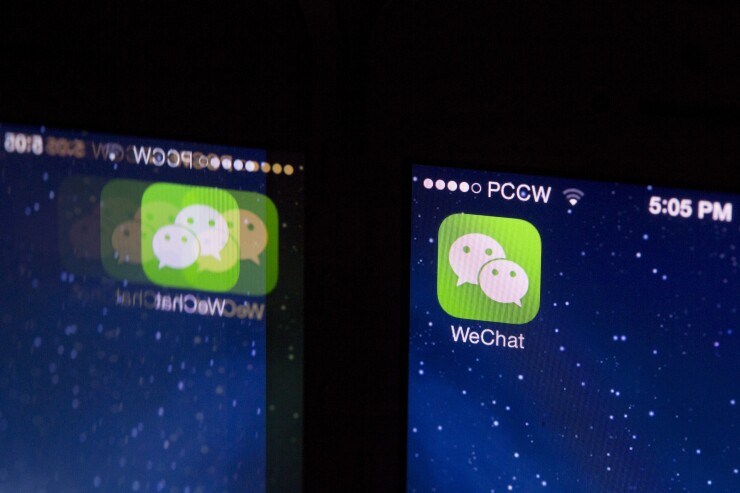For London-based fintech provider Tramonex, seeing so many Chinese tourists visiting the U.K. meant a chance to join the success of WeChat Pay. But how to accomplish this was less clear.
An estimated 300 million consumers in China have the WeChat Pay app loaded on their phones. Tramonex and Hong Kong-based payment gateway partner Valoot Technologies have partnered with Tencent's WeChat to support WeChat Pay mobile wallet for Chinese travelers in the U.K.
"We were in a situation not that many months ago that we knew this was huge, but didn't know how to approach it," said Ovidiu Olea, founder and CEO of Valoot.
The partnership creates a scenario in which WeChat operates like a card scheme, Tramonex becomes the acquirer and Valoot provides the payment gateway and handles marketing of the new service.

But the partners are constrained in what they can do to bring WeChat's offering to market in the U.K. "A lot of this will be driven by WeChat operator Tencent Holdings in China, as every decision has to be run by them as they get their brand out to other parts of the world," Olea said.
Because Tramonex had so many merchant relationships established and licenses needed to process payments in the U.K., it took only a few months to introduce a system in which Chinese consumers can scan a QR code supplied to a merchant and use it to trigger a WeChat Pay payment.
While Tramonex has extensive experience in international payments, it will have to adjust to the acquiring role with WeChat.
"We did our research to determine the pattern of where Chinese tourists tend to visit throughout the U.K. and Western Europe as well," said Tramonex CEO Amine Berraoui. "Those are the merchants we are approaching first on this, with the value proposition of serving Chinese tourists and a lower price of payment acceptance, compared to cards and other methods."
The tourists no longer have to rely on local cash or travel cards because they can make payments in renminbi, the national currency, through the WeChat app. Generally, WeChat Pay users link to a payment card—most likely a UnionPay card—or a bank account.
Tramonex and Valoot are smart to address the Chinese tourist with WeChat and their ability to spend money in Europe, said Thad Peterson, senior analyst with Boston-based Aite Group.
"When you walk through London and look at all of the China UnionPay stickers, you know the Chinese are there in force," Peterson added. "UnionPay has been there a long time, so it's not a major transition to accept those payments through a mobile app over there."
The Baidu Wallet, operated through the massive Chinese search engine company and established three years ago as a rival to Alipay and WeChat Pay, also provides service abroad for Chinese tourists. Overall, several companies have sought partnerships in the past few years to
Many of those partnerships focus around travel needs, such as purchases at airports, but the companies involved are expanding their options. Late last year, Tencent partnered with
It's that sort of initiative that allows Tramonex and Valoot to think about what could come of the partnership with WeChat Pay after firmly establishing the service in the U.K. The sky's the limit, as far as they are concerned.
"WeChat actually has the opportunity to become a worldwide e-wallet in the future," Valoot's Olea said. "Right now, we are establishing a permit for Chinese going abroad to use WeChat Pay, but other countries like Hong Kong send visitors to the U.K. and Tencent recently received a stored-value license to allow consumers in Hong Kong to load their cards on WeChat."
Such a scenario could emerge in other regions for WeChat, Olea said.
"If they put their minds to it, I think we are on the cusp of something much bigger than just Chinese tourists traveling abroad," he added. "In theory, you could have the world's first e-wallet."
Of all the markets worldwide, the U.S. may be the most complicated, with different regulations in each state, Berraoui said. This is why Tramonex is keeping its focus firmly on Europe at this time, he added. "We want to get traction in Europe and then look at other areas."
If the partners begin to target other markets, WeChat's QR code system may have the most luck in developing countries that don't have established point of sale systems with Near Field Communication and other recent technologies, Aite's Peterson said.
"It would really depend on the market, but there has to be sufficient demand for the merchant environment to support yet another payments platform," Peterson said.





